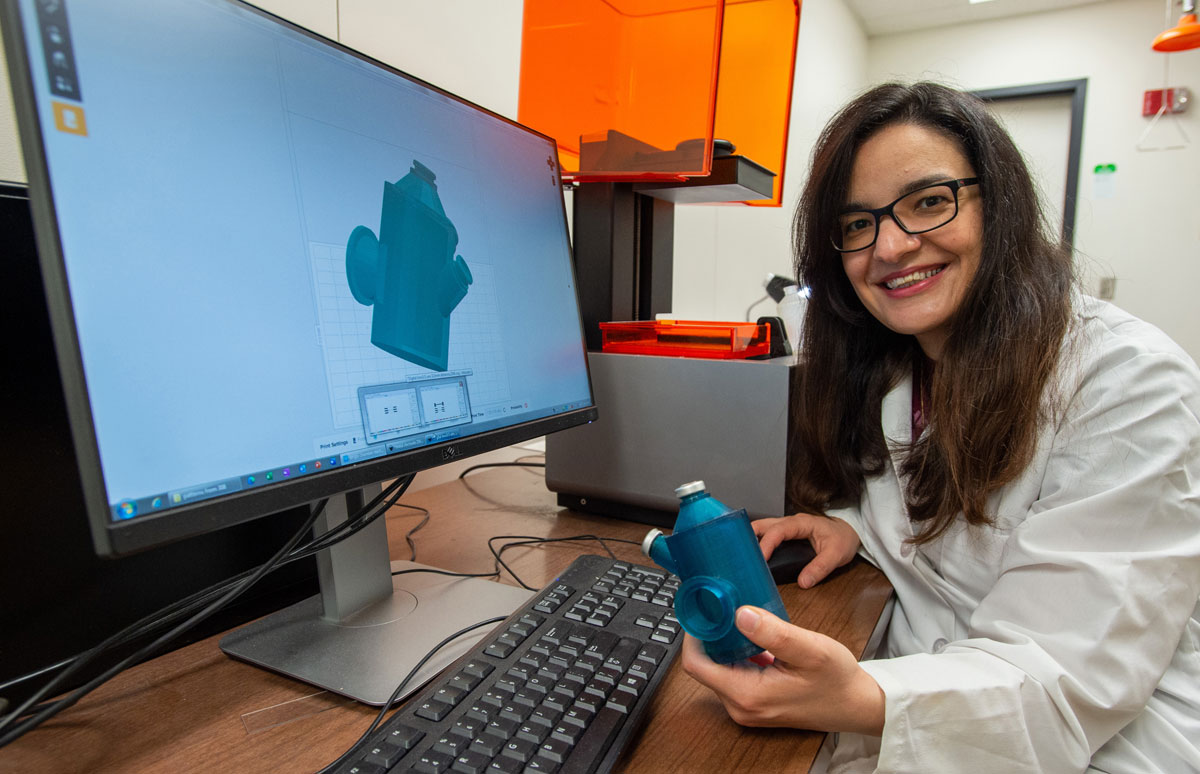
Narges Asefifeyzabadi, a doctoral student in chemistry and biochemistry at Southern Illinois University Carbondale, works in the laboratory recently. She represented the university online at the Midwest Association of Graduate Schools’ conference in March after winning SIU’s Three-Minute Thesis competition. (Photo by Russell Bailey)
April 23, 2021
Doctoral chemistry student wins 3MT communication contest, represents SIU at conference
CARBONDALE, Ill. – A Southern Illinois University Carbondale doctoral student in chemistry and biochemistry represented the university at a regional contest after winning a local competition for the most compelling thesis in the Graduate School.
Narges Asefifeyzabadi, who is earning her doctorate, won first place in the SIU Graduate School’s Three-Minute Thesis competition. Asefifeyzabadi received an $800 award and represented SIU online at the Midwest Association of Graduate Schools’ conference in March.
Asefifeyzabadi’s research area examines the interplay between chemistry, biosensing, bioelectronics, biomaterials, and bioengineering as it relates to breakthroughs in wearable sensors. She also has worked on developing low-cost biosensors using printing platforms for point-of-care diagnostics and biomedical applications.
Teaching communication skills
The Three Minute Thesis – also known as the 3MT competition – was developed by the University of Queensland to celebrate the exciting research conducted by doctoral students. The exercise is aimed at cultivating the students’ academic, presentation and research communication skills and supports their capacity to effectively explain their research in three minutes, in language understandable to anyone.
Twenty-two doctoral students participated in the event, said Stephen Shih, associate dean and director of the SIU Graduate School. Three faculty members acted as judges.
“The 3MT competition provides our graduate students with a superb opportunity to sharpen their skills in articulating complex and sometimes esoteric research subject areas clearly and effectively,” Shih said. “It will increase graduate students’ ability to effectively communicate with people from other disciplines or even nonacademic, nonspecialist audiences and to explain the key points and significance of their research in layman's terms within a short period of time.”
A different kind of challenge
Asefifeyzabadi said the competition differed from presentations she often gives at research conferences, and it helped her grow as a communicator.
“Not only did it required me to effectively explain a compelling discussion on my research topic and its significance to the general public, but it also was a fast-paced competition that demanded summarizing my four-plus years of research in only three minutes and with only one slide,” she said. “It was an exciting, one-of-a-kind opportunity. I believe this competition helps graduate students to develop such valuable skills that are not perhaps addressed properly elsewhere.”
Second and third place winners
Ryan Crawford and Ali Parizad placed second and third, earning $500 and $300 cash awards, respectively. Crawford is earning his doctorate in English, while Parizad is earning his doctorate in electrical and computer engineering.
Each student gave a brief spoken-word presentation using only a single, static PowerPoint slide. Judges assessed participants’ presentations in several areas, including comprehension and content, communication and research significance, among others.
